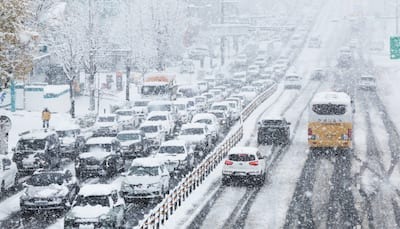
Seoul and surrounding areas on Wednesday received the heaviest November snowfall in 117 years, injuring several people, snarling traffic and disrupting power supplies, as officials remained on high alert for more snowfall this weekend. Are. As of 3 p.m., 18 centimeters of snowfall had fallen in the capital city, the heaviest snowfall in November since modern weather observations began in 1907, according to the Korea Meteorological Administration (KMA).
The new record was set with the first snowfall of the season in Seoul. The state weather agency said the previous record was 12.4 cm snowfall on November 28, 1972. The city of Incheon, west of Seoul, also recorded 14.8 cm snowfall as of 3 p.m. in November, breaking the previous record of 8 cm snowfall set in 1972, Yonhap news agency reported. Suwon, south of Seoul, received 21 cm of snowfall as of 3 p.m., the heaviest snowfall for any month in November, according to the KMA.
Snow and rain are forecast across the country through Thursday morning, although rain will continue over parts of Gangwon province and North Gyeongsang province through the afternoon and over Chungcheong and Jeolla provinces and Jeju Island late Friday night. The Interior Ministry had raised the operations of the Central Disaster and Security Countermeasures Headquarters to Level 2 and raised the warning of heavy snowfall from “caution” to “alert”.
While standard measurements for the capital city are taken at the Seoul Weather Center located in Jongno Ward, as of 7 a.m. Wednesday, Seongbuk Ward and Gangbuk Ward, located in the north of the city, had received 20.6 cm and 20.4 cm of snowfall, respectively.
According to the KMA and the Seoul metropolitan government, heavy snowfall warnings were issued for districts northeast of Seoul, including Nowon, Seongbuk and Dobong. A warning is issued if snowfall reaches 20 cm within 24 hours. In Seoul’s Songpa district, three people were injured and taken to nearby hospitals when a snow fence erected near a construction site collapsed due to snowfall. According to police and fire officials, one of them suffered serious injuries.
More than 170 homes were blacked out at 5:30 a.m. in Seoul’s Seongbuk district, according to Korea Electric Power Corporation, as heavy snowfall caused trees to possibly fall on telegraph poles and power lines.
Power supply was also disrupted to dozens of other homes in Eunpyeong-gu, Yonhap news agency reported. One person was killed and nine were injured in car accidents caused by heavy snowfall in Gangwon province, according to local officials. As of 6 p.m., 150 flights were canceled at airports across the country due to snowfall, including 71 at Incheon International Airport, west of Seoul, according to Korea Airports Corporation and Incheon International Airport Corporation.
The operation of 89 passenger boats on 70 routes across the country was halted, and entry to seven national parks including Mount Bukhan and Mount Serak was restricted. The disaster control tower also warned of traffic congestion during morning and evening rush hours, accidents on icy roads and safety issues for pedestrians due to heavy snowfall.
Interior Minister Lee Sang-min instructed officials to carry out snow removal work thoroughly. Starting at 7 a.m., the Seoul Metropolitan Government, in collaboration with district governments and related agencies, began clearing snow, with workers removing snow from subway station entrances and around bus stations.
The city has also increased operations by 30 minutes on the metro during morning and evening rush hours, when trains arrive at more frequent intervals, on Lines 2 and 5 to 8, as well as for intra-city buses. The extended hours will be maintained until Level 2 of the three-tier response system is removed.
 look news india
look news india